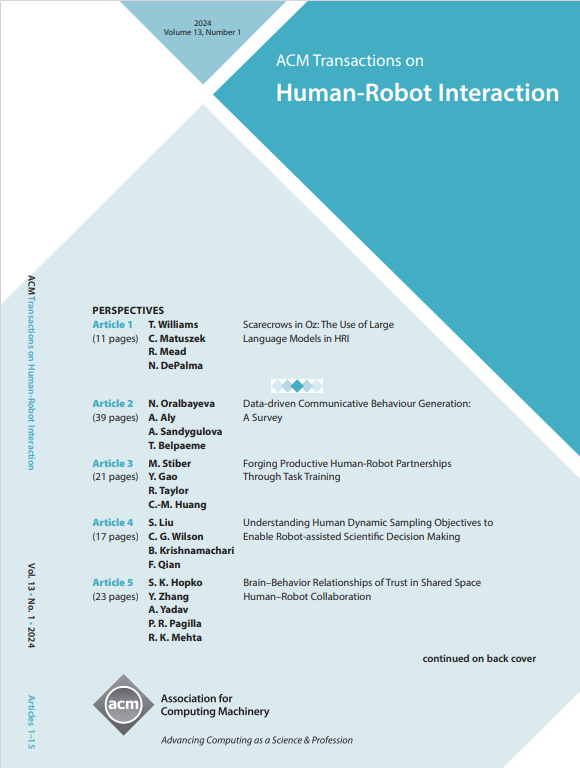Brain-Behavior Relationships of Trust in Shared Space Human-Robot Collaboration
IF 5.5
Q2 ROBOTICS
引用次数: 0
Abstract
Trust in human-robot collaboration is an essential consideration that relates to operator performance, utilization, and experience. While trust’s importance is understood, the state-of-the-art methods to study trust in automation, like surveys, drastically limit the types of insights that can be made. Improvements in measuring techniques can provide a granular understanding of influencers like robot reliability and their subsequent impact on human behavior and experience. This investigation quantifies the brain-behavior relationships associated with trust manipulation in shared space human-robot collaboration (HRC) to advance the scope of metrics to study trust. Thirty-eight participants, balanced by sex, were recruited to perform an assembly task with a collaborative robot under reliable and unreliable robot conditions. Brain imaging, psychological and behavioral eye-tracking, quantitative and qualitative performance, and subjective experiences were monitored. Results from this investigation identify specific information processing and cognitive strategies that result in identified trust-related behaviors, that were found to be sex-specific. The use of covert measurements of trust can reveal insights that humans cannot consciously report, thus shedding light on processes systematically overlooked by subjective measures. Our findings connect a trust influencer (robot reliability) to upstream cognition and downstream human behavior and are enabled by the utilization of granular metrics.共享空间人机协作中信任的脑-行为关系
人机协作中的信任关系到操作者的性能、利用率和经验,是一个重要的考虑因素。虽然信任的重要性是众所周知的,但研究自动化中的信任的最先进的方法,如调查,极大地限制了可以获得的见解的类型。测量技术的改进可以让我们更细致地了解机器人可靠性等影响因素及其对人类行为和经验的后续影响。本研究量化了共享空间人机协作(HRC)中与信任操纵相关的脑-行为关系,以扩大研究信任的指标范围。38名参与者,按性别平衡,被招募在可靠和不可靠的机器人条件下与协作机器人一起执行组装任务。脑成像、心理和行为眼动追踪、定量和定性表现以及主观体验均被监测。这项调查的结果确定了导致确定的信任相关行为的特定信息处理和认知策略,这些行为被发现是性别特异性的。使用隐蔽的信任测量可以揭示人类无法有意识地报告的见解,从而揭示被主观测量系统地忽视的过程。我们的研究结果将信任影响者(机器人可靠性)与上游认知和下游人类行为联系起来,并通过使用粒度指标实现。
本文章由计算机程序翻译,如有差异,请以英文原文为准。
求助全文
约1分钟内获得全文
求助全文
来源期刊

ACM Transactions on Human-Robot Interaction
Computer Science-Artificial Intelligence
CiteScore
7.70
自引率
5.90%
发文量
65
期刊介绍:
ACM Transactions on Human-Robot Interaction (THRI) is a prestigious Gold Open Access journal that aspires to lead the field of human-robot interaction as a top-tier, peer-reviewed, interdisciplinary publication. The journal prioritizes articles that significantly contribute to the current state of the art, enhance overall knowledge, have a broad appeal, and are accessible to a diverse audience. Submissions are expected to meet a high scholarly standard, and authors are encouraged to ensure their research is well-presented, advancing the understanding of human-robot interaction, adding cutting-edge or general insights to the field, or challenging current perspectives in this research domain.
THRI warmly invites well-crafted paper submissions from a variety of disciplines, encompassing robotics, computer science, engineering, design, and the behavioral and social sciences. The scholarly articles published in THRI may cover a range of topics such as the nature of human interactions with robots and robotic technologies, methods to enhance or enable novel forms of interaction, and the societal or organizational impacts of these interactions. The editorial team is also keen on receiving proposals for special issues that focus on specific technical challenges or that apply human-robot interaction research to further areas like social computing, consumer behavior, health, and education.
 求助内容:
求助内容: 应助结果提醒方式:
应助结果提醒方式:


